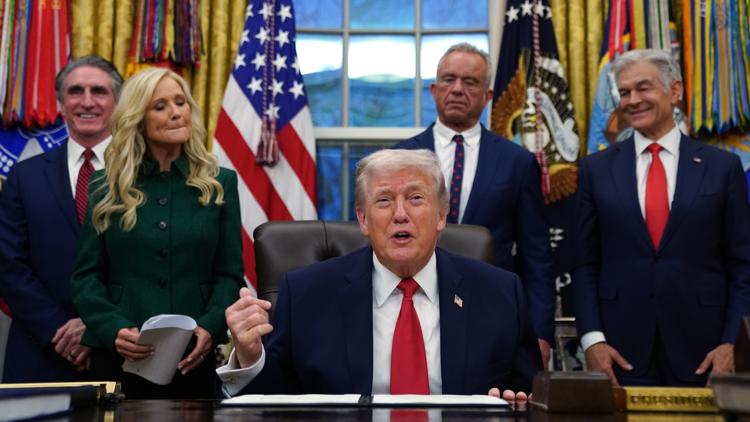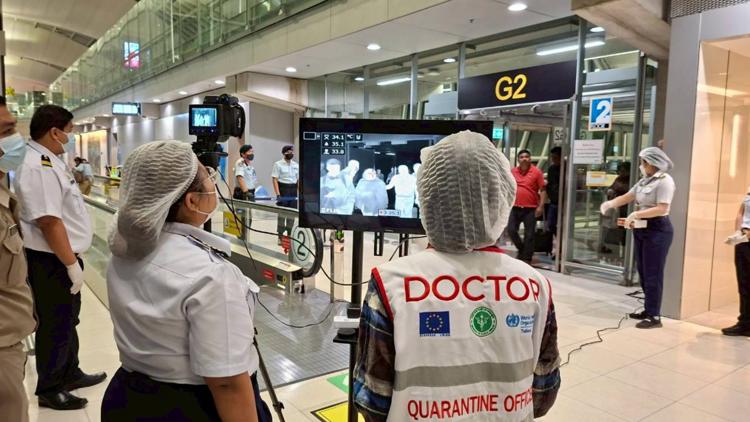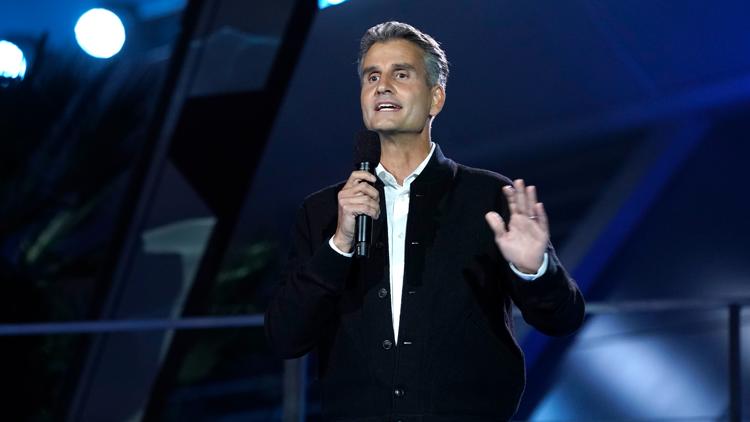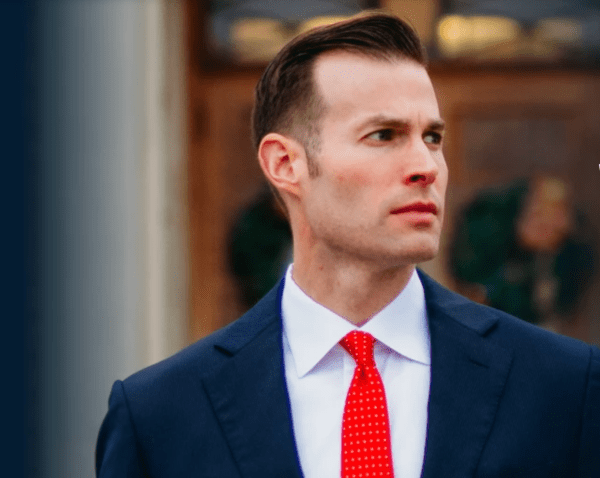What's next in Trump's Gaza plan
The first phase of President Trump’s peace framework for the war in Gaza has so far gone mostly according to plan, but what comes next to achieve longer-lasting peace in the region seems up in the air.

Morning Report is The Hill's a.m. newsletter. Subscribe here.
In today's issue:
▪ Trump in DC after whirlwind Middle East trip
▪ Mills set to jump into Maine Senate race
▪ AI bubble burst may loom
▪ Zelensky to meet Trump in Washington
The first phase of President Trump’s peace framework for the war in Gaza has so far gone mostly according to plan, but what comes next to achieve longer-lasting peace in the region seems up in the air.
Trump returned to Washington early Tuesday after a whirlwind one-day trip to the Middle East that served as the culmination of his efforts to bring an end to the two-year-long war between Israel and Hamas.
After more than two years in captivity, the final 20 survivors who were still held by Hamas were released Monday. The militant group killed 1,200 people and took more than 250 hostage during its Oct. 7, 2023 attack.
Trump in a speech before the Israeli Knesset heralded the ceasefire and hostage release as the latest global conflict to end under his watch.
"Yesterday I was saying seven, but now I can say eight. The hostages are back. The hostages are back," he said.
Over the course of the war, more than 150 hostages were freed during ceasefires, either in the first two or the current one, and more than a half dozen were rescued during Israeli operations in Gaza, The Washington Post noted. More than 80 hostages were confirmed killed. Most of their bodies have been returned, but two dozen remain unaccounted for.
By most objective measures, the first phase of Trump’s 20-point plan went off without issue.
Israel withdrew from most of Gaza soon after both sides agreed to the deal, and much-needed aid, including food, water and medicine, started flowing into the territory. Hamas released its remaining living hostages within the 72-hour deadline, as Israel released 250 Palestinian prisoners and 1,700 people arrested after the Oct. 7 attack.
After meeting with members of the hostages’ families, Trump took a victory lap during his address before the Knesset, expressing confidence that the peace can last.
“Israel, with our help, has won all that they can by force of arms. You’ve won. Now, it is time to translate these victories against terrorists on the battlefield into the ultimate prize of peace and prosperity for the entire Middle East. It’s about time you were able to enjoy the fruits of your labor,” Trump said.
But what comes next isn’t so clear.
One aspect of this first phase has already become a point of contention — the release of the bodies of deceased hostages in Gaza. There were 28 bodies remaining in Gaza ahead of the deal, but Hamas has only released four of them to be turned over to Israel.
That isn’t too surprising, as Hamas had warned that finding the bodies of all the dead hostages would take time and was unlikely to be completed by the Monday at noon local time deadline.
But it is one delicate issue that could undermine efforts to keep the peace. Israel has been consistent throughout the war that returning the bodies of the dead was a prerequisite for ending the fighting.
The Hostages and Missing Families Forum, a group of advocates and families of the hostages, signaled that the ceasefire should be suspended over Hamas’s failure to return all 28 bodies. The group has generally been a strong supporter of deals for a ceasefire and the release of hostages.
“Hamas’s violation of the agreement must be met with a very serious response from the government and the mediators,” the group said in a statement.
Trump’s full peace plan would also include major changes for the region that could take years to accomplish if they come to fruition. Perhaps the most significant aspect is Hamas agreeing to cede power in Gaza, where it has been in control for nearly two decades.
The plan calls for the Palestinian Authority, which governs the West Bank, to take control of Gaza after making a number of reforms. But Hamas hasn’t fully agreed to give up power or disarm, as is also required under the deal.
▪ The New York Times: "For Israel, Hamas and Trump’s peace plan, now comes the hard part."
▪ The Hill: Five notable moments from Trump’s Knesset speech.
Trump expressed optimism at a signing ceremony in Egypt associated with the Israel-Hamas ceasefire agreement, saying “It’s going to hold up,” though some experts and even allies have been more cautious.
“Disarming Hamas and making sure they never have a voice in the future of Gaza is going to require efforts by the region never known before,” Sen. Lindsey Graham (R-S.C.) said in a post on the social platform X.
Some internal Israeli divisions were also on display during Trump’s Knesset speech.
Two Knesset members were ejected while Trump spoke after they shouted slogans at him. Ayman Odeh, an Arab Israeli who is a member of the far-left Hadash Alliance, and Ofer Cassif, another member of the coalition, called for recognizing a Palestinian state and to “demand justice.”
Israeli Prime Minister Benjamin Netanyahu has rejected the idea of recognizing a Palestinian state, despite Trump’s plan eventually envisioning one.
The prime minister of Qatar, who helped negotiate the deal, has said Israel and Hamas weren’t ready for a full agreement, so the more complex issues were postponed in the interest of getting the fighting to stop and the hostages released. But with those steps completed, several thorny issues loom.
Trump on Monday also leaned into domestic Israeli politics when he requested that Israeli President Isaac Herzog pardon Netanyahu to allow the prime minister to avoid trial in his bribery and fraud case. Netanyahu was first charged years ago, but the case has stalled, dragging on for more than half a decade.
Critics have alleged that Netanyahu, who has pleaded not guilty, has pushed for the war to continue to delay his trial, citing diplomatic and national security grounds. He’s expected to take the witness stand in the case on Wednesday.
"It was just a perfect spot. It was good timing," Trump told reporters of his impromptu remarks while returning home to Washington early Tuesday.
"It's a little risque, you know, to bring it up a pretty sore subject in Israel, but the people were fantastic."
▪ The Hill: Five takeaways from Trump’s trip to mark Gaza peace deal.
SMART TAKE with BLAKE BURMAN
The historic moment in the Middle East rightfully dominated much of the attention Monday, as Trump met with hostage families, spoke to the Knesset and gathered with world leaders in Egypt. It all unfolded as the remaining living hostages were freed and reunited with their families.
Back at home, financial markets reacted to a different moment from the president: his post on Sunday in which he seemed to back off his 100 percent tariff threat for China. “Don’t worry about China, it will all be fine! Highly respected president Xi just had a bad moment,” Trump wrote. With that message, markets flew.
I spoke with House Armed Services Committee ranking member Adam Smith (D-Wash.), who recently visited China as part of a congressional delegation.
“At the end of the day, China wants to grow economically, and they are tied into the global economy in a way that, say, for instance, Russia or Iran or certainly North Korea is not,” Smith said. “China really can't afford to get into an all-out conflict with the US, any more than we can afford to get into an all-out conflict with them.”
Trump’s Friday and Sunday posts led to multitrillion-dollar market swings. He is scheduled to meet with Ukrainian President Volodymyr Zelensky later this week, but markets will be watching to see if a meeting with Chinese President Xi Jinping materializes soon or not.

Burman hosts "The Hill" weeknights, 6p/5c on NewsNation.
3 Things to Know Today
1. Trump is set to posthumously award the Presidential Medal of Freedom to Charlie Kirk today. Congress approved a resolution designating Tuesday as a day of remembrance for Kirk, who was assassinated while at a Turning Point USA event last month, honoring him on what would have been his 32nd birthday.
2. The North Carolina GOP is launching an effort to try to redraw its congressional district lines, the latest development in the national redistricting battle involving states including California and Texas.
3. Defense Secretary Pete Hegseth is touting the Pentagon’s efforts to remove a certain number of unfit National Guard troops in Illinois after a photo depicting seemingly heavyset troops went viral.
Leading the Day

TWO'S COMPANY: Maine Gov. Janet Mills (D) is expected to launch her Senate campaign Tuesday, setting up an intraparty battle as progressives have already flocked to a previously little-known oyster farmer for the Democratic nomination to go up against Sen. Susan Collins (R).
Mills’s decision comes after months of speculation that she would enter the race and encouragement from Senate Minority Leader Chuck Schumer (D-N.Y.). Her candidacy will be welcome news to top Democrats who hoped to score another high-profile recruit as the party tries to win back as many seats as it can in Congress’s upper chamber next year.
As a two-term governor popular with her party, Mills will be the front-runner for the Democratic nomination. But her path to the nomination doesn’t seem quite as unobstructed as it was at one time.
Graham Platner, an oyster farmer, is making his first run for public office and has spent the past two months rallying progressive support behind his campaign, potentially setting up a bitter intraparty primary.
He’s notched high-profile endorsements from progressives like Sen. Bernie Sanders (I-Vt.) and Rep. Ro Khanna (D-Calif.). Sanders even called on Mills to stay out of the race, warning that her entry would require an expensive, “unnecessary and divisive” primary.
A coalition of youth-focused groups endorsed Platner on Tuesday morning, The Hill's Caroline Vakil reports. That includes David Hogg's Leaders We Deserve, Voters of Tomorrow, College Democrats of America, Gen-Z for change and Youth Save Democracy.
“After our historic loss in the 2024 election, conversations within the Democratic Party have rightly centered on age, the loss of young men, the working class, and the growing disillusionment of young voters,” Hogg said in a statement. “As our party charts a path forward, Graham Platner represents not the entire solution, but a vital step in the right direction.”
The primary seems poised to be a proxy battle between various wings of the Democratic Party: establishment vs. outsider, moderate vs. progressive and old guard vs. younger generations.
Platner is in his early 40s, while Mills would be 79 upon taking office, instantly making her one of the oldest members of the Senate.
With the party looking for generational change, particularly after the concerns about former President Biden’s fitness to serve a second term, the idea of backing another almost octogenarian might not be ideal for some Democrats.
But Democrats will also want to consider who will give them the best chance to unseat Collins, the only Republican senator up for reelection next year in a state that voted for former Vice President Kamala Harris last November.
Democrats were bullish about defeating Collins in 2020 as she ran for reelection in a presidential election year that Biden ultimately won. They were enthusiastic about then-state House Speaker Sara Gideon, who led Collins in most polling ahead of the election.
But Collins outperformed expectations and easily defeated Gideon, disappointing Democrats.
This makes electability a key characteristic for any potential Democratic nominee, even more than it already would be.
FIRST IN THE HILL: A Democratic group announced today it's making a six-figure investment in New Jersey Assembly races ahead of the state's elections next month.
The Democratic Legislative Campaign Committee, which works to elect Democrats to state legislatures, made its investment after an initial five-figure investment in August. Democrats enjoy a dominant 52-28 margin in the state assembly right now, but several legislative district races will be closely watched in November.
The investment also comes as Rep. Mikie Sherrill (D-N.J.) and Republican Jack Ciattarelli battle in the state's gubernatorial race, with the GOP hoping to pull off an upset.
OUTLETS REJECT PENTAGON PRESS POLICY: Several major media outlets have refused to sign on to the terms of the Pentagon's new restrictive press policy, with the department threatening to take press passes by Wednesday without signatures.
Those who released statements refusing to sign include The Washington Post, The New York Times, The Associated Press, CNN, The Atlantic, The Wall Street Journal, NPR, Reuters, The Guardian, Newsmax and The Washington Times, the Post reported.
The right-wing news outlet One America News is the only one so far that's said it will sign the policy, according to the Post.
The policy from Defense Secretary Pete Hegseth initially banned journalists from most hallways of the Pentagon without an official escort. It also prohibited them from reporting information not approved for release by the Defense Department, even if that information isn't classified.
The updated policy doesn't technically bar journalists from reporting that information, but they could be deemed a "security or safety risk" if they ask personnel for it, according to a draft of the rules.
The Pentagon Press Association came out against the policy last week, saying Hegseth and others have been “systematically limiting access to information about the U.S. military.”
If outlets don't agree to the policy by 5 p.m. today, their reporters are supposed to hand in their credentials and leave Pentagon facilities.
Hegseth responded to various news outlets announcing their rejection of the policy with a goodbye handwave emoji.
PRESSURE BUILDS ON MILITARY PAY: Today marks the last day before members of the military are set to potentially miss their first paychecks with the government shut down.
Service members would normally be set to receive their pay on Wednesday, the 15th of the month. While members of both parties have expressed concerns about the scheduled miss payments and have called for congressional action, it doesn’t seem likely to happen before tomorrow, barring a last-minute change.
Trump directed Hegseth to use all “available funds” to pay military members during the shutdown, but whether that can provide the temporary relief is unclear. Rep. Jim Himes (D-Conn.) argued Trump’s move to redirect funding is “probably not” legal.
A bill has been introduced in the House to pay the military during the shutdown, but Speaker Mike Johnson (R-La.) has repeatedly said he wouldn’t bring the House back into session until Senate Democrats vote to pass Republicans’ continuing resolution and reopen the government. That’s been a nonstarter for Democrats.
▪ The Hill: Can Trump pay troops without Congress? Some Democrats don’t think so.
▪ The Hill: House Minority Leader Hakeem Jeffries (D-N.Y.) says Trump hasn’t given Johnson ‘permission’ to meet.
PROSECUTOR REMOVED: A top prosecutor in the U.S. attorney’s office that brought charges against former FBI Director James Comey and New York Attorney General Letitia James (D) has been removed from her role, CNN reported Monday.
Maggie Cleary, a career prosecutor who briefly led the office in the Eastern District of Virginia, is the latest to leave the office in the aftermath of Trump ally Lindsey Halligan being appointed interim U.S. attorney.
The Trump administration and Halligan have faced considerable scrutiny over their decisions to bring cases against Comey and James, two high-profile critics of the president. They came after career prosecutors, including the former Trump-appointed U.S. Attorney Erik Siebert, indicated that they didn’t feel they had sufficient evidence to bring the cases.
Siebert resigned from office under pressure from the administration, with Cleary temporarily taking over leadership of the office before Trump appointed Halligan.
One source familiar with the dynamic in the office told CNN that Halligan wanted to move around prosecutors whom she believes might oppose her on politically charged cases.
▪ NBC News: Former Trump national security adviser John Bolton could be charged soon.
When and Where
The president will meet with Argentine President Javier Milei at 1 p.m. ahead of a bilateral lunch with him. He will participate in a Medal of Freedom ceremony for Kirk at 4 p.m.
The House willconvene at 2 p.m. for a pro forma session.
The Senate willmeet at 3 p.m.
Zoom In

AI BUBBLE: A rising number of voices are expressing concern that an artificial intelligence bubble could be growing as related companies see their valuations skyrocket, The Hill’s Julia Shapero reports.
High-profile figures involved in AI, from OpenAI CEO Sam Altman to Amazon founder Jeff Bezos, have suggested that investors may have become overly excited about the technology, adding to concerns about the circular nature of AI spending.
“You never really know until afterwards whether today’s prices were justified by the future cash flows of these companies or whether investors were overly exuberant,” James Angel, an associate professor at Georgetown University’s McDonough School of Business, told Shapero.
AI has become increasingly appealing to investors since the launch of OpenAI’s ChatGPT in 2022, helping the chip-producing company Nvidia become the most valuable company in the world.
Other major Big Tech companies like Apple, Google, Amazon, Microsoft and Meta have also expanded greatly through AI investment. But Shapero reports that it’s spurred concerns that stock prices are rising faster than underlying values, creating a bubble.
Goldman Sachs analysts indicated that at least so far, the rise in stock prices has been accompanied by solid underlying growth. And some argue that AI is more of a driver of the stock market than the economy itself.
“Overall, you want to watch the job market if you are trying to form an opinion about the economy,” Callie Cox, the chief market strategist at Ritholtz Wealth Management, said. “And right now, AI doesn’t have much impact on the job market.”
▪ The Washington Post: "Two industries were supposed to drive America’s future. One is booming, the other slumping."
▪ Reuters: Global smartphone shipments rise on AI upgrades.
Elsewhere

ZELENSKY IN DC: Ukrainian President Volodymyr Zelensky is set to visit Trump at the White House on Friday to discuss the possibility of the U.S. providing Tomahawk missiles to Ukraine in its war with Russia.
The meeting comes after Zelensky expressed hope that an ending to the Russia-Ukraine war, which has been ongoing for more than three and a half years, could come to an end with the ceasefire achieved in Gaza. It also comes as Trump has changed some of his rhetoric on the war, suggesting to the United Nations General Assembly last month that Ukraine could win back all the territory that Russia has taken in the war.
Trump said on Sunday that he might send the long-range Tomahawk missiles to Ukraine if Russia doesn’t settle the war soon. He’s increasingly expressed frustration with Russian President Vladimir Putin not yet agreeing to a resolution to the conflict.
Former Russian President Dmitry Medvedev warned against the move, saying Trump sending the missiles to Ukraine could “end badly” for everyone. He argued that it is impossible to tell the difference between such a missile with a nuclear warhead and a conventional one.
Zelensky said he and Trump will discuss a “series of steps” that he will propose.
“Therefore, the main focus of the visit is air defense and our long-range capabilities aimed at exerting pressure on Russia for the sake of peace,” he said.
▪ New York Magazine: “Why Putin and Russia may be running out of time in Ukraine.”
▪ The New York Times: “Why Ukraine is betting on strikes deep inside Russia.”
Opinions
Depredations of congressional authority dominate, from Obama to Trump, writes The Hill’s Chris Stirewalt.
Pass the CREATE Act, keep the US entertainment industry competitive, Reps. Nicole Malliotakis (R-N.Y.) and Judy Chu (D-Calif.) and actor Jon Voight write in The Hill.
The Closer

And finally … Attorney General Pam Bondi played off Amy Poehler’s "Saturday Night Live" portrayal of her, saying she is “loving” it.
“@Sec_Noem, should we recreate this picture in Chicago? Loving Amy Poehler!” she said in a post on X, tagging Homeland Security Secretary Kristi Noem, who was also included in the episode over the weekend.
The sketch poked fun at Bondi’s appearance before the Senate Judiciary Committee last week, in which she was asked about various issues, including Trump’s National Guard deployments.
The Department of Homeland Security also highlighted the sketch, thanking the show for “free advertising” for Immigration and Customs Enforcement.
“Get Criminals Out. Make History. Save America,” its post on X reads.
What's Your Reaction?


























































